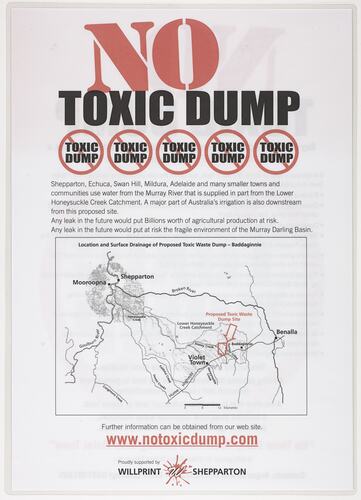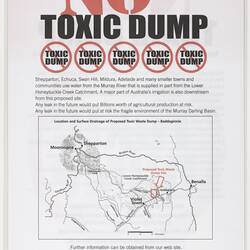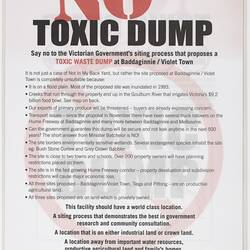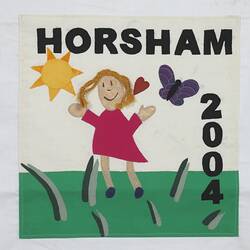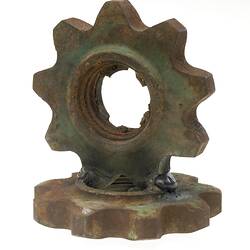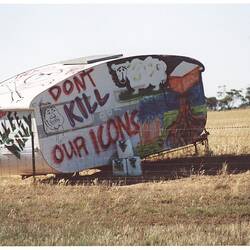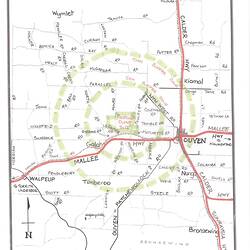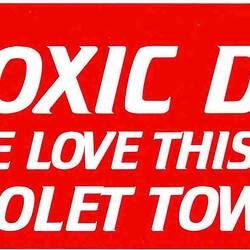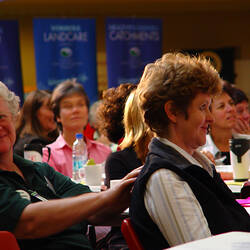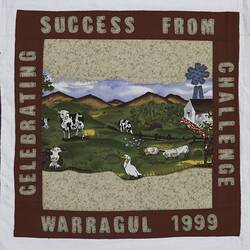Summary
Laminated poster created to protest against the toxic waste depot being installed at Violet Town, circa 2002-2004. This poster was displayed at the 2004 Horsham Women on Farms Gathering as part of a protest display about the toxic waste issue affecting the local communities.
Part of Museums Victoria's Invisible Farmer Project Collection. The Invisible Farmer Project was the largest ever study of Australian women on the land, uncovering the histories and stories of Australian women in agriculture. It began as a pilot project (2015-2016) and evolved into a three year (2017-2020) nation-wide partnership between rural communities, academic, government and cultural organisations, funded by the Australian Research Council.the absence of rural women in mainstream histories and museums.
Description of Content
Two women standing in the doorway of a hall type building, they are talking, and the woman on the right is holdinga skein of thread and a spray bottle. In the background, three women are standing around a banner laid out craoss a large work table.
Physical Description
Laminated A4 sheet, red and black printed text. Reverse contains map indicating site of proposed toxic dump.
Significance
From their beginnings in the early 1990's Victorian Women on Farms Gatherings have aimed to give women the opportunity to voice their political concerns and to be heard by the general public and Government, with particular reference to issues affecting farming families and rural women. According to the 1992 Numurkah Gathering Proceedings, the 'aims of the Gathering' included a general aim to 'raise the public awareness of the vital role of agriculture to the economy and fabric of Australian life'. During the Gatherings issues of contemporary relevance and significance have been raised and supported through a variety of mediums including speeches, workshops, tours, networking and merchandising. One such issue is that of the proposed toxic waste dumps in the early 2000s. Proposals for three toxic waste sites across Victoria were issued in November 2003 to private landowners in the areas of Violet Town/ Baddaginnie, Ouyen/Tiega, and Pittong/south of Ballarat. Landowners were given a period of six months in which to respond to the compulsory acquisition of their land. The No Toxic Waste Dump committees were set up at each of the three locations to fight these proposals, which were ultimately successful.
The Toxic Waste Campaign affected many participants of the Women on Farms Gathering community and was represented by displays, banners, petitions and other materials at the 2004 Horsham Women on Farms Gathering. The No Toxic Dump campaign highlighted the ongoing issues affecting our sustainable futures: waste management and landfill options, social and economic survival of small rural communities, protecting water catchment areas, zero waste policy, unsustainable consumption, and the inequity between city and country communities. The campaign became an excellent example of community capacity building. It brought together small communities with a shared vision to challenge these proposals, providing a basis for the development of skills and knowledge and creating a means of building cohesion within and between the communities. Whole communities worked co-operatively together with success.
More Information
-
Collection Names
-
Collecting Areas
Sustainable Futures, Working Life & Trades, Home & Community
-
Acquisition Information
Donation from Ms. Kerry Wilson - Women on Farms Gathering Benalla, 13 Jul 2004
-
Place & Date of Event
-
Place Depicted
-
Inscriptions
Front, printed, red and black: 'NO TOXIC DUMP / Say no to the Victorian Government's siting process that proposes a TOXIC WASTE DUMP at Baddaginnie/Violet Town' and extensive further text. Reverse: 'NO TOXIC DUMP' and associated text.
-
Classification
Agriculture & rural life, Community activity, Protest materials
-
Category
-
Discipline
-
Type of item
-
Overall Dimensions
217 mm (Width), 302 mm (Height)
-
Keywords
Agriculture, Community Groups, Farms, Farming Information, Gender Issues, Politics, Rural Life, Rural Women, Women's Associations, Women on Farms Gatherings, Work, Waste Management, Globalisation
